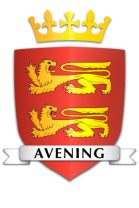

© Avening Parish Council 2023
“Preserve, Conserve, Enhance”
7 Hubert Vivian Ind
Private: 7th Battalion, Gloster Regiment. Hubert was born on Avening’s High Street on Monday the 5th of June 1893 and was baptised at our Holy Cross Church on Sunday the 3rd of September. He was the eldest of nine children born to Arthur Ind (born Avening 1869) and his wife Ada née Edmunds (born Avening 1871) and it was probably because of overcrowding that he was living with his maternal grandmother, Esther Edmunds (born Avening 1845) in Woodstock. We know little of his early life but he volunteered for army service at the outbreak of war and became part of the 7th Battalion, Gloucester Regiment (known as the Glosters). His battalion was committed to the Balkans war in June 1915 and spent some time training in Egypt before moving to Lemnos, the Greek island some 50 km from the Turks at Gallipoli. The War Diaries of the Gloucestershire Regiment record that the 7th Battalion was at Lemnos on the 1st and 2nd of August 1915 and embarked for the Gallipoli peninsula on the 3rd, landing north of Anzac Cove on 4th August to provide reinforcements for the troops who had been there since April. On the 6th they moved to Aghyl Dere in preparation for the Battle of Sari Bair. At 3 am on the 8th August the Glosters, together with Pioneers of the 8th Battalion, Welch Regiment, were sent to support the New Zealand Wellington battalion in an assault of Chunuk Bair, an important spur of high ground, essential for later advances on the Turkish forces. The advance was very slow as the soldiers had to file along a mule track in the dark with dugouts on both sides and, a short while after, they came under machine gun fire from the Turks who had the advantage of being on the higher ground. Progress was difficult as the terrain consisted of steep, scrub- covered spurs, sheer cliffs and narrow, winding ravines. Although the Wellington Battalion, with the Glosters on their left, managed to take Chunuk Bair, it was difficult to hold in the face of Turkish attacks. The Glosters were then asked to move to the right of the Wellington Battalion to support it against counterattack. However, the Turks continually attacked, first with shell fire and then with their infantry. This meant there was no time for the forces to entrench more than a few inches. They would also have been suffering from scorching hot, dry conditions, with very little food or water to sustain them. Despite the Turkish attacks and heavy losses of men, the line was held until the battalion was relieved. Every Officer and Senior NCO had been either killed or wounded and, by the end of 8th August, the battalion consisted of small groups of men commanded by Junior NCOs or Privates. The battalion was relieved at dusk and the men ordered to make their way back to Battalion HQ independently. The losses were 45 killed, 115 wounded and 190 missing. Hubert was one of the latter, declared missing on 11th August 1915. He has no known grave but he is remembered, along with other members of the Gloucestershire Regiment, on the Helles Memorial on the Gallipoli Peninsula. He received, posthumously, the Victory Medal, the British War Medal and the 1915 Star with a Balkans clasp. He was unmarried. We have been unable to contact any known relative. During my research, I came across the following poem by M. Kemal Ataturk, the founder of today’s Turkish Republic, written in 1934: Those heroes that shed their blood And lost their lives You are now lying in the soil of a friendly country Therefore, rest in peace. There is no difference between the Johnnies And the Mehmets to us where they lie Side by side Here in this country of ours. You, the mothers Who sent their sons from far away Countries Wipe away your tears. Your sons are now lying in our bosom And are in peace. After having lost their lives on this land They have Become our sons as well.
AveningArchive
WW1 Heroes





© Avening Parish Council 2023
AveningArchive
7 Hubert Vivian Ind
Private: 7th Battalion, Gloster Regiment. Hubert was born on Avening’s High Street on Monday the 5th of June 1893 and was baptised at our Holy Cross Church on Sunday the 3rd of September. He was the eldest of nine children born to Arthur Ind (born Avening 1869) and his wife Ada née Edmunds (born Avening 1871) and it was probably because of overcrowding that he was living with his maternal grandmother, Esther Edmunds (born Avening 1845) in Woodstock. We know little of his early life but he volunteered for army service at the outbreak of war and became part of the 7th Battalion, Gloucester Regiment (known as the Glosters). His battalion was committed to the Balkans war in June 1915 and spent some time training in Egypt before moving to Lemnos, the Greek island some 50 km from the Turks at Gallipoli. The War Diaries of the Gloucestershire Regiment record that the 7th Battalion was at Lemnos on the 1st and 2nd of August 1915 and embarked for the Gallipoli peninsula on the 3rd, landing north of Anzac Cove on 4th August to provide reinforcements for the troops who had been there since April. On the 6th they moved to Aghyl Dere in preparation for the Battle of Sari Bair. At 3 am on the 8th August the Glosters, together with Pioneers of the 8th Battalion, Welch Regiment, were sent to support the New Zealand Wellington battalion in an assault of Chunuk Bair, an important spur of high ground, essential for later advances on the Turkish forces. The advance was very slow as the soldiers had to file along a mule track in the dark with dugouts on both sides and, a short while after, they came under machine gun fire from the Turks who had the advantage of being on the higher ground. Progress was difficult as the terrain consisted of steep, scrub-covered spurs, sheer cliffs and narrow, winding ravines. Although the Wellington Battalion, with the Glosters on their left, managed to take Chunuk Bair, it was difficult to hold in the face of Turkish attacks. The Glosters were then asked to move to the right of the Wellington Battalion to support it against counterattack. However, the Turks continually attacked, first with shell fire and then with their infantry. This meant there was no time for the forces to entrench more than a few inches. They would also have been suffering from scorching hot, dry conditions, with very little food or water to sustain them. Despite the Turkish attacks and heavy losses of men, the line was held until the battalion was relieved. Every Officer and Senior NCO had been either killed or wounded and, by the end of 8th August, the battalion consisted of small groups of men commanded by Junior NCOs or Privates. The battalion was relieved at dusk and the men ordered to make their way back to Battalion HQ independently. The losses were 45 killed, 115 wounded and 190 missing. Hubert was one of the latter, declared missing on 11th August 1915. He has no known grave but he is remembered, along with other members of the Gloucestershire Regiment, on the Helles Memorial on the Gallipoli Peninsula. He received, posthumously, the Victory Medal, the British War Medal and the 1915 Star with a Balkans clasp. He was unmarried. We have been unable to contact any known relative. During my research, I came across the following poem by M. Kemal Ataturk, the founder of today’s Turkish Republic, written in 1934: Those heroes that shed their blood And lost their lives You are now lying in the soil of a friendly country Therefore, rest in peace. There is no difference between the Johnnies And the Mehmets to us where they lie Side by side Here in this country of ours. You, the mothers Who sent their sons from far away Countries Wipe away your tears. Your sons are now lying in our bosom And are in peace. After having lost their lives on this land They have Become our sons as well.WW1 Heroes



























